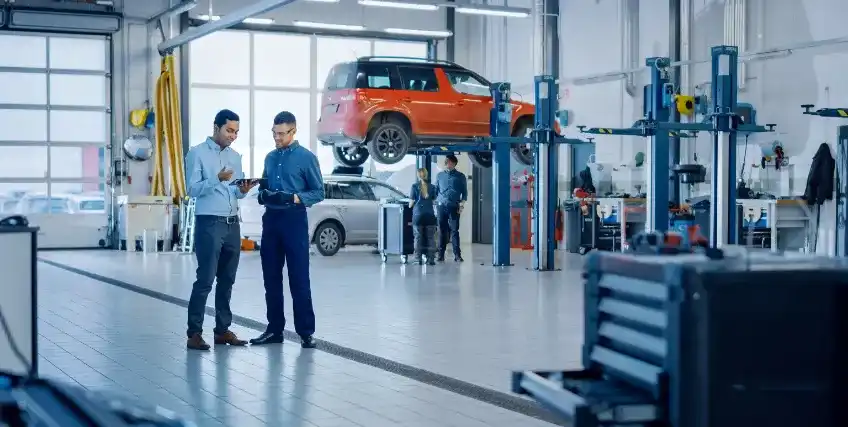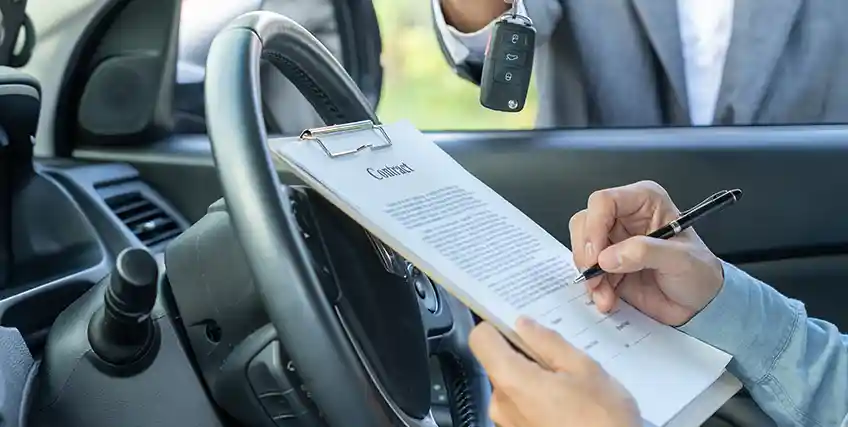The Future of Auto Shop Loans: Trends and Innovations in 2026
October 17, 2025 | Last Updated on: October 17, 2025

Auto repair businesses in the U.S. have undergone rapid evolution over the last few years. Today, it is not just about fixing engines. It is also about managing technology and customer expectations, which means rising operating costs. This why auto shop loans have become a vital financing tool for shop owners who are planning to expand their services.
In 2026, the automotive industry will undergo a digital transformation in auto shop financing. Artificial Intelligence (AI), online lending platforms, and new auto repair financing models are already making it more efficient and accessible for small businesses to borrow money.
This article examines the future prospects for auto shop loans and how emerging lending innovations will transform the U.S. auto repair industry in 2026 and beyond.
Why Auto Shop Loans Are Becoming Essential?
Currently, there are more older cars than newer ones on U.S. roads. According to a S&P global mobility survey, the average age of vehicles on U.S. roads reached 12.6 years in 2024, up from 2023. This means that currently, there are more older cars than newer ones in the U.S. Older vehicles are more likely to break down, creating greater demand for repair services.
However, staying competitive in the auto repair industry requires steady cash flow. From diagnostic tools to EV equipment, modern repairs require high upfront investment. That's where auto shop loans come in and help to:
- Fund expensive machinery and lifts.
- Purchase inventory and spare parts.
- Manage employee payroll and other monthly bills.
- Offer customers auto service financing or flexible payment plans.
Another critical reason why auto shop loans are essential is access to quick financing. This is because auto shop owners often face delayed customer payments or slow processing of insurance claims. During such situations, owners can maintain smooth operations through loans.
The Shift from Traditional to Modern Auto Shop Loans
For decades, repair shop owners relied on traditional financing options like banks, credit unions, or personal loans for expansion. While traditional lenders still play a major role, online lenders and fintech companies are redefining access to credit.
Here's a quick comparison:
| Type | Traditional Banks & Credit Unions | Modern Online Lenders & Fintech Platforms |
|---|---|---|
| Speed | 7–15 business days for approval | Often same-day or next-business-day approval |
| Credit Check | Strict credit score requirements | Flexible use of cash flow or POS data |
| Loan Amount | Higher but slower disbursement | Small to mid-size quick loans |
| Interest Rate | Lower interest rate for excellent credit | Slightly higher but faster funding |
| Application Process | Paper-heavy, in-person | 100% online with pre-qualification |
With online auto loans, businesses can now apply digitally, get prequalified, and receive funds, all without visiting a bank branch.
Trends Shaping Auto Shop Loans in 2026 and Beyond
1. Digital Lending Ecosystems
Modern lending is no longer restricted to physical branches. Auto shop loans are now processed through cloud-based lending systems that use automation to reduce human intervention.
Borrowers can:
- Fill out an application online.
- Upload their credit report, business license, or revenue proof.
- Receive a decision quickly.
Digital platforms are particularly helpful for those with poor credit or thin credit history, since they analyze alternative data such as sales volume, on-time payments, and online reviews, to assess eligibility.
2. AI-Based Credit Assessment and Risk Modeling
AI-powered financial tools are revolutionizing how lenders evaluate auto repair shops for loans. Modern online lending platforms use AI models that can assess borrower's credit profiles using real-time data from:
- Point-of-sale (POS) systems
- Supplier payment records
- Customer satisfaction metrics
- Financial transactions
This allows lenders to go beyond the traditional credit score. Even borrowers with fair credit can get prequalified for auto shop loans if they show consistent revenue.
AI also reduces bias and speeds up underwriting, offering personalized loan terms based on each shop's risk profile.
3. Alternative and Non-Bank Financing Options
Not every business meets the strict criteria set by traditional banks. That's why 2026 is seeing an explosion of alternative financing options for auto repair loans.
These include:
- Merchant Cash Advances (MCAs): Quick funding based on future card sales.
- Equipment Financing: Using repair tools or lifts as collateral.
- Invoice Factoring: Selling unpaid invoices to free up working capital.
- Short-Term Installment Loans: Smaller loan sizes with quicker repayment cycles.
Credit unions and community banks are also expanding auto repair financing programs, often with lower interest rates and fewer origination fees than large banks.
4. Green and Sustainable Auto Shop Financing
Environmental awareness has been reshaping lending priorities in recent years. This trend is expected to grow in 2026 as many auto shop loans now include incentives for eco-friendly upgrades such as:
- Installing solar panels.
- Setting up EV charging stations.
- Using energy-efficient tools and paints.
5. Embedded and Partnership-Based Financing
Lenders are partnering with auto part suppliers, dealerships, and financial services firms to embed financing directly into their platforms.
This means repair shop owners can access auto shop loans at checkout when purchasing equipment or inventory, similar to "Buy Now, Pay Later" for businesses.
Such integrations simplify the application process and speed up approvals to within one business day.
Innovations Making Auto Shop Loans More Accessible
Technology is not just about speed, it's also about smarter lending. Here are some key innovations that have been driving the auto shop loans market in 2025:
- Predictive Cash-Flow Analytics: Tools that forecast the business' ability to make monthly payments and adjust repayment terms dynamically.
- Personalized Loan Offers: Platforms that use API integrations with accounting tools like QuickBooks to offer real-time loan options.
- Blockchain Verification: Ensuring secure digital document exchange and transparent repayment terms.
- Same-Day Funding: Enabled through instant ACH transfers and open banking APIs.
- Credit-Building Features: Online lenders reporting on-time payments to credit bureaus to improve business credit scores over time.
The Role of Credit Score and Borrower Profile
The business credit score remains the foundation of any lending decision. A higher score means a lower interest rate and better loan terms.
Here's how lenders typically classify borrowers:
| Credit Score Range | Profile Type | Loan Access |
|---|---|---|
| 750+ | Excellent credit | Best interest rate, lowest origination fees |
| 700–749 | Good credit | Broad range of auto repair loans |
| 640–699 | Fair credit | Moderate annual percentage rate (APR) |
| 600–639 | Poor credit | Limited loan options; higher interest rate |
| Below 600 | Bad credit | May need secured loans or co-signers |
Lenders also analyze the credit report, credit history, and on-time payments. For borrowers with bad credit, some online lenders offer auto repair financing backed by business revenue instead of personal collateral.
Tip: Review credit report from all three credit bureaus- Equifax, Experian, and TransUnion, before applying.
Government and SBA-Backed Auto Shop Loans
Government support remains a key pillar for small businesses. The U.S. Small Business Administration (SBA) offers programs like the 7(a) and 504 loans, often used for auto repair shops seeking expansion.
- SBA 7(a) Loans: Flexible use of proceeds, loan amounts up to $5 million, long repayment terms.
- SBA 504 Loans: Designed for fixed assets like property or heavy machinery.
- Microloans: Ideal for smaller loan sizes (under $50,000) with shorter repayment terms.
The SBA loans are regulated by lenders under NMLS (Nationwide Multistate Licensing System), ensuring borrower protection and transparent practices.
For shops with excellent credit, these programs can offer a lower interest rate and manageable monthly payments over several years.
How to Choose the Best Auto Shop Loans
To get the best auto repair loan, make sure your financial goals match what the lender offers.
Here's what businesses must consider before applying:
- Eligibility: Minimum time in business, annual revenue, and credit score requirements.
- Loan Amount: Select a loan that suits your needs.
- Interest Rate & APR: Compare annual percentage rates (APRs) to gauge total borrowing costs.
- Loan Terms: Understand repayment terms, such as short-term versus long-term.
- Origination Fees: These are often between 1% and 5% of the loan amount.
- Collateral: Check if it's a secured or unsecured loan.
- Prepayment & Refinancing Options: Some lenders allow early payoff without penalty.
- Customer Support: A responsive lender is available to assist during payment delays or refinancing discussions.
When possible, always obtain prequalification offers to see your estimated interest rate without a hard credit check.
The Future Outlook for Auto Shop Loans Beyond 2025
The next wave of innovation will make auto shop loans more personalized and performance based. Businesses may expect:
- Automated repayment tracking linked to credit card and POS systems.
- Dynamic loan restructuring during slow business months.
- Refinancing opportunities as credit scores improve.
- Wider adoption of digital-only lenders with zero paperwork and 24/7 customer support.
- Financial inclusion for underbanked shop owners and minority entrepreneurs.
As auto repair shops evolve into tech-driven service hubs, equipped with EV tools, smart diagnostics, and digital warranties, the financial ecosystem funding them must evolve too.
Conclusion
Auto shop loans are becoming faster, more digital, and data driven. By 2026, shop owners will experience quicker credit decisions, faster approvals, and more financing options tailored to their various needs.
Whether you're an established auto body shop or a small garage just starting out, understanding your credit profile, comparing loan options, and choosing the right lender can help secure your business's financial future.
As lending becomes more focused on technology, transparency, and trust, auto shop loans are helping the U.S. auto repair industry grow stronger and more sustainable.
FAQs About Auto Shop Loans
1. What are auto shop loans, and how do they work?
Auto shop loans help repair shop owners cover expenses such as purchasing new equipment, expanding their space, or paying for repairs. Lenders usually look at your credit score, business income, and cash flow before deciding if you qualify.
2. Can I qualify for auto shop loans with bad credit?
Many online lenders work with business owners who have bad credit by looking at their revenue and payment history. Please keep in mind that you may be offered a higher interest rate or a smaller loan amount.
3. What are the best auto repair loans for small businesses?
Some good options for auto repair loans are SBA 7(a) loans, equipment financing, and unsecured loans from trusted online lenders. Be sure to compare interest rates, loan terms, and fees before you apply.
4. Can I apply for shop auto loans online?
Yes, you can apply for most auto shop loans online. The process is usually quick, you can get prequalified, upload your documents, and sometimes get approved quickly.
5. Are there government programs for auto repair financing?
Yes, there are government programs that help auto shops get financing. The SBA, credit unions, and local development funds often offer loans with lower rates and flexible repayment options for small businesses.
Frequent searches leading to this page
Term Loans are made by Itria Ventures LLC or Cross River Bank, Member FDIC. This is not a deposit product. California residents: Itria Ventures LLC is licensed by the Department of Financial Protection and Innovation. Loans are made or arranged pursuant to California Financing Law License # 60DBO-35839




